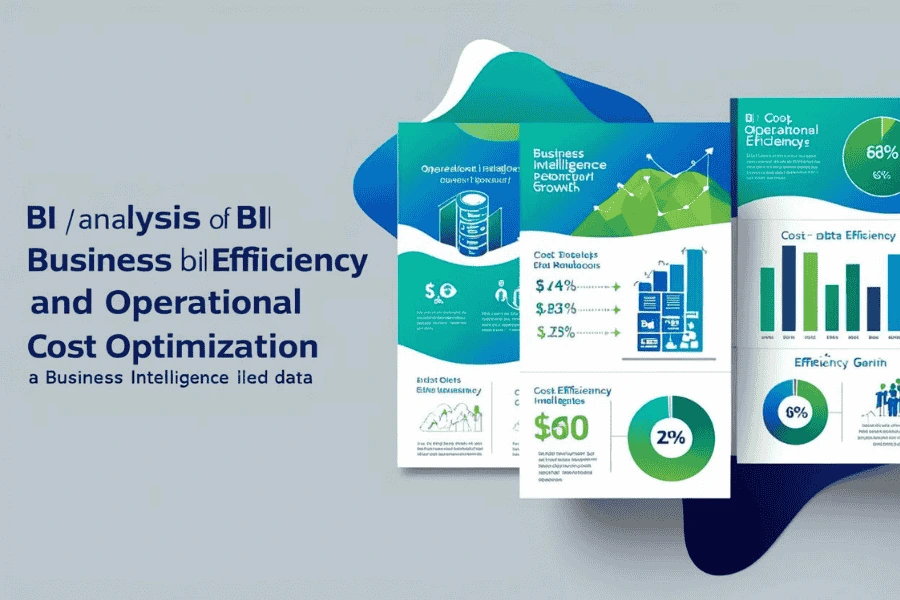The Role of BI in Operational Efficiency and Cost Optimization
Introduction
In the modern business environment, companies are leveraging business intelligence (BI) and data analytics tools more than ever to boost operational efficiency and achieve significant cost optimization. By utilizing advanced business intelligence software and BI solutions, organizations can convert raw data into meaningful insights, enabling smarter data-driven decision making that improves overall performance and reduces expenses.

Understanding Business Intelligence
Business intelligence is a collection of technologies, processes, and tools including business analytics tools and data visualization tools that help organizations gather, analyze, and present data. These capabilities allow businesses to monitor key metrics, identify improvement opportunities, and streamline workflows.
Why BI is Crucial for Efficiency and Cost Reduction
The true value of BI lies in the visibility it provides through tools like KPI dashboards and BI reporting tools, which help businesses gain insights into their operations in real time. This transparency supports better process optimization and supply chain optimization, allowing companies to implement effective cost control techniques. A well-defined BI strategy also supports operational risk management and strengthens a company's ability to adapt quickly to changing market demands.
Enhancing Operational Efficiency with BI
Using operational analytics within enterprise BI platforms, organizations can detect inefficiencies and bottlenecks more effectively. Automated reporting and monitoring save time and reduce errors. Moreover, technologies such as predictive analytics and machine learning in BI empower businesses to predict maintenance needs known as predictive maintenance and minimize unplanned downtime, thereby enhancing operational continuity.
How BI Supports Cost Optimization
BI tools play a vital role in helping businesses control expenses by uncovering major cost drivers with cost analysis tools and financial analytics. These insights enable better management of procurement, supplier relationships, and inventory, which leads to reduced waste and smarter capital allocation. Additionally, BI supports energy and resource management, helping companies implement sustainable practices that reduce operational costs.
Challenges Faced When Implementing BI
While BI offers many advantages, challenges such as maintaining data quality, integrating data from diverse sources, and encouraging BI adoption among users can hinder success. The initial costs and complexity of BI deployment addressed through adherence to BI implementation best practices may be a concern, particularly for smaller firms. Fostering a culture centered around data-driven decision making is critical for overcoming these barriers.
The Future Landscape of BI
The future of BI is moving towards more sophisticated real-time business intelligence solutions, allowing instant data access. The emergence of self-service BI tools is empowering a wider range of employees to generate insights without IT assistance. Incorporating machine learning in BI and enhanced predictive analytics will enable organizations to proactively manage risks and optimize resources. Additionally, mobile BI solutions are increasing flexibility by providing access to data anytime, anywhere.
Practical Applications of BI
In manufacturing, companies use BI dashboards to monitor equipment health and perform predictive maintenance, reducing downtime and repair costs. Retailers rely on business intelligence software and data visualization tools to manage inventory more effectively, cutting storage expenses. The healthcare industry benefits from operational analytics that optimize patient flow and resource usage, demonstrating BI’s broad impact across sectors.
Best Practices for Effective BI Utilization
To maximize BI’s potential, businesses should choose BI software that integrates seamlessly with current systems and offers advanced business analytics tools. Emphasizing data quality and following BI implementation best practices will ensure reliable insights. Developing a strong culture of data-driven decision making and regularly updating BI strategies to incorporate emerging technologies like AI are essential for long-term success.
Conclusion
Business intelligence is a powerful enabler of enhanced operational efficiency and effective cost optimization. With the right BI tools and strategies, organizations can identify inefficiencies, optimize expenditures, and maintain a competitive edge. Adopting BI technologies and cultivating a data-focused culture are crucial steps toward achieving sustainable business growth.
Active Events
Maximizing Your Earnings: 7 Strategies for Business Analysts in 2024
Date: Aug 07, 2025 | 7:00 PM (IST)
7:00 PM (IST) - 8:10 PM (IST)
2753 people have registered
Navigating the World of SERP Features: Tips, Tricks, and Strategies
Date: Aug 07, 2025 | 7:00 PM(IST)
7:00 PM(IST) - 8:10 PM(IST)
2811 people have registered
Bootcamps
Data Analyst Bootcamp
- Duration:8 weeks
- Start Date:October 5, 2024
Data Science Bootcamp
- Duration:8 weeks
- Start Date:October 5, 2024
